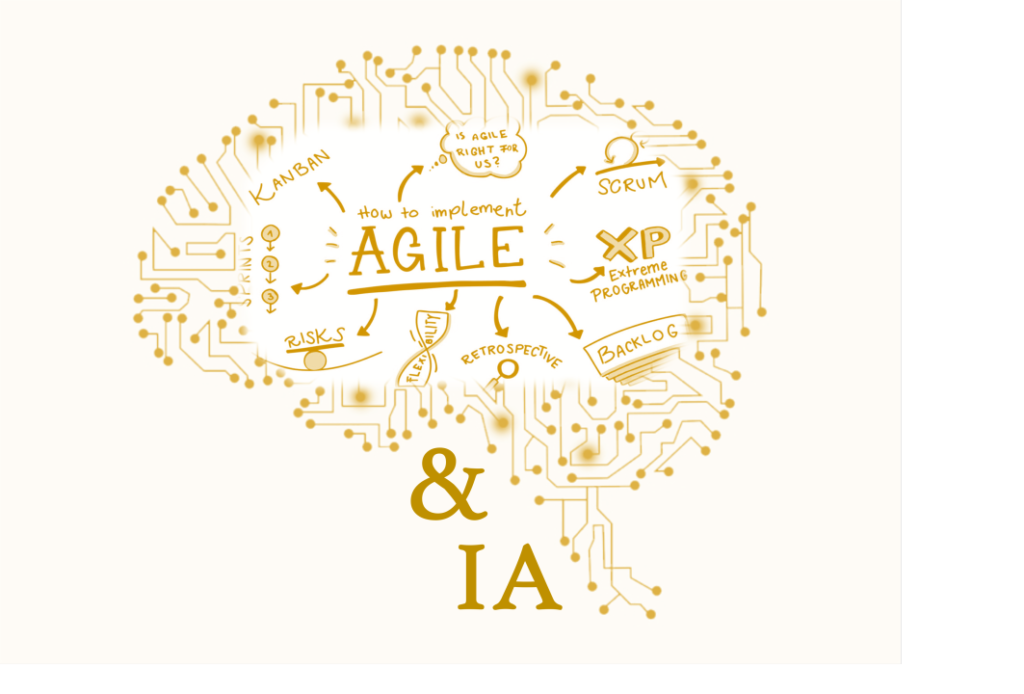Two case studies where AI enables process optimization
Case Study 3: Revolutionizing Agile planning with AI
A forward-thinking software company aimed to transcend the limitations of its agile sprints to boost the efficiency of its development teams. Despite adherence to agile principles, sprint planning was hampered by inaccurate work estimates and uneven load distribution. To overcome these obstacles, the company turned to artificial intelligence.
The challenge was to refine the accuracy of sprint planning, ensuring a fair allocation of work that reflected each member’s skills and preferences, while improving detection of risks of delays and optimization of resources.
In response, the company has designed an innovative AI tool capable of:
- Examine historical sprint performance to identify trends and patterns.
- Refine effort estimates through machine learning, for greater accuracy over time.
- Propose task allocation based on skills, experience and personal preferences, while taking current workload into account.
- Identify risks of delays in advance, enabling proactive adjustments to stay on course.
Each sprint began with a planning session using the AI tool to evaluate data from previous sprints and make recommendations for the upcoming sprint. Project managers and scrum masters then adjust the plan according to these insights and other relevant considerations.
Using the AI tool quickly paid off, resulting in :
- More accurate estimates: Task duration forecasts improved significantly, reducing variances and refining planning.
- Work balance: A better distribution of tasks evened out the workload, boosting team satisfaction and reducing the risk of burnout.
- Risk prevention: The ability to anticipate delays enabled timely action, adjusting plans to ensure deadlines were met.
- Improved performance: The quality and punctuality of deliverables improved, testifying to optimized sprint and risk management.
Key takeaways: The integration of Artificial Intelligence into our company’s agile methodologies has underscored the significant capacity of AI to address challenges in project management effectively. The implementation of the AI solution has enhanced the precision of our project planning and boosted both team satisfaction and productivity. This example serves as a compelling demonstration of how AI can revolutionize agile practices, providing a valuable blueprint for entities aiming to refine their development strategies.
Case study 4: Agile revolution in the financial sector with AI
In the dynamic and complex world of the financial sector, one company stood out for its leadership. However, faced with market volatility and the growing complexity of its projects, it turned to artificial intelligence to refine its agile practices, particularly in the Scrum and Kanban approaches. The objective was clear: reduce operational costs while gaining in flexibility to better adapt to market fluctuations.
The major challenge was to improve the accuracy of risk forecasting and optimize the use of resources to maintain a competitive edge. To achieve this, the company developed a cutting-edge AI solution to:
- Examine historical data and market trends to identify risk patterns.
- Provide reliable estimates of risks and opportunities for each project using sophisticated machine learning and predictive analysis methods.
- Proactively adjust project plans and resource allocation, helping project managers to prevent difficulties and rationalize efforts.
- Integrate these insights directly into the company’s agile project management tools for seamless application of recommendations.
Implementation of the solution was integrated into the company’s project management cycle, with regular checks to evaluate and adjust project strategies based on the tool’s predictions. Teams were trained to understand and apply the data provided by the solution in their day-to-day management.
The benefits of the solution have been significant:
- Reduced operating costs: Accurate forecasts have enabled us to avoid unnecessary expenditure and better allocate resources, thereby significantly reducing costs.
- Refined Risk Management: The solution’s early warnings facilitated proactive risk mitigation, minimizing delays and cost overruns.
- Improved Agility: The company became more responsive to market changes, rapidly adjusting its plans based on predictive analysis and trends.
- Optimized Project Performance: Efficient resource management and risk prevention led to improved project completion, with reduced delivery times and enhanced quality.
Insights gained: The incorporation of Artificial Intelligence into our firm’s agile methodologies demonstrates the transformative power of cutting-edge technologies in reshaping project management within the finance industry. Leveraging predictive analytics for more nuanced risk management enabled the company to enhance its operational efficiency and bolster its resilience against market volatility. This example underscores the capacity of AI to augment agile practices, setting the stage for more insightful and flexible project management approaches.
To find out more :
“AI for Agile Development: A Meta-Analysis”, this paper written by Beatriz Cabrero-Daniel on May 14, 2023, examines how artificial intelligence (AI) can be effectively integrated within Agile software development methodologies. The analysis focuses on five main aspects:
- Integration benefits: Incorporating AI into Agile practices increases process efficiency by optimizing task allocation, test prioritization and risk management.
- Barriers to integration: The adoption of AI within the Agile framework encounters challenges, including the need for specialized socio-technical expertise and the complexities involved in deploying and monitoring AI systems.
- Ethical considerations: The increasing importance of ethical issues around AI in Agile development highlights the imperative of integrating ethical considerations into AI-assisted development projects.
- Study methodology: The analysis draws on a systematic literature review and meta-analysis to explore the potential role and future applications of AI in the Agile context.
- Future prospects: The analysis highlights the importance of further research to better understand the impact of AI on Agile methodologies, as well as to overcome the obstacles to its effective integration.
Link: https://arxiv.org/abs/2305.08093
Article written by Esteban MARTINEZ QUEROL
